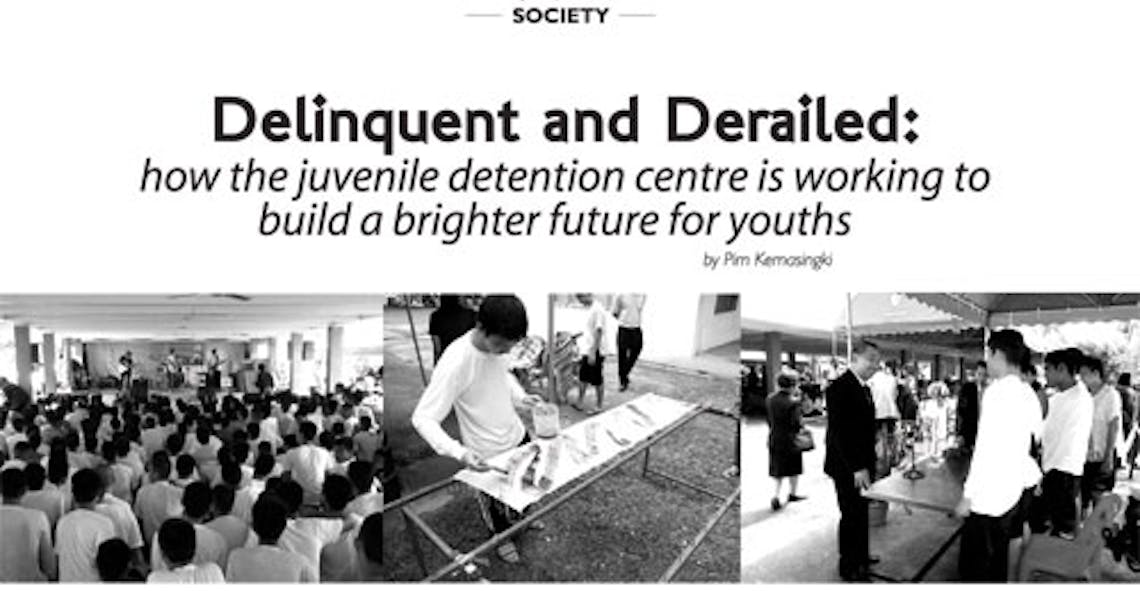Set on 80 rai of land dotted with large rain and banyan trees in the back lanes of Mae Rim is the Chiang Mai Juvenile Detention Centre which houses 107 juvenile delinquents. Most of these youths – 98 boys and 9 girls – are in their late teens, though there are a couple as young as 13, and the great majority of them are there because of drugs.
Citylife was invited by Sangla Intajak, a Royal appointed lay judge, to attend the first Creativity and Project Day, attended by Juvenile Detention Centre youths from all northern provinces, totalling 610. The day was filled with musical concerts, performances as well as a display of skills and craftsmanship.
Once a youth is arrested, from anywhere in the north of Thailand, they are sent to the Chiang Mai arraignment centre before being put in front of a judge at the 5th Region Juvenile Court. While the Chief Judge of the court is a career judge, there are many royally endorsed judges, such as Sangla, who are upstanding members of society, appointed to act as lay judge. “Hundreds of us apply every year, some are housewives, others are business people,” explains Sangla. “We then have to take a course and sit an exam, and if we pass, then we are selected by a panel before having our names put forward for Royal appointment. This is not about glory. We take our responsibilities very seriously and we spend a lot of time with each child in order to help them to rehabilitate. We get paid 1,000 baht a case, and generally have a few cases a month. I don’t know any judge who accepts the money. We all donate it back to the Juvenile Court Foundation.”
Following sentencing, the youth are transferred to provincial detention centres where their rehabilitation begins.
“When a child arrives they immediately get two weeks with a psychiatrist and two weeks with a social worker,” explains Siriprakai Worapreecha, Director of Chiang Mai’s Juvenile Detention Centre. “We believe in rehabilitation, not punishment. We try to pressure the courts to reduce sentences; we also work very hard to try to pressure the police to wipe the records of these children. The social stigma can affect them for life. It is all about opportunity and solving problems, diffusing the time bomb which many of these children could become. Because we have so many volunteer or honorary appointed people working in the system, as you can see, we are very open and transparent. There are no horror stories of corporal punishment here, we welcome any assistance and simply want to help the kids.”
Siriprakai, who is a psychiatrist herself, goes on to explain that the centre receives 30 million baht per year from the government, 15 million of which goes towards staff salaries and 12 towards food and bare necessities, leaving very little for child-development and counselling. This is why the Juvenile Court Foundation was formed.
Dr. Narong Tananuwat, a successful Chiang Mai businessman who owns and runs a large group of companies, is the Chairman of the Juvenile Court Foundation, yet another voluntary position, whose job it is to raise funds to support the centre. “I was appointed a year and a half ago, and since then we have raised a fair bit of money,” he said. “We held a golf tournament and raised 700,000 baht towards upgrading buildings at the school, buying musical instruments as well as building a nursery. I also use my business experience to help improve systems and accountings here. I find huge gratification in working to help these kids have a better future.”
“Much of the problem here is the society, not the kids,” said Siriprakai. “Just about every child here is from a broken home and all they want is stability and an opportunity. They are normal kids with some problems. They all have schooling as well as vocational opportunities, but the issue is that they can’t put down the name of the school in their resumes, so we have to use the name of another establishment. This means that they can’t join in inter-school activities, such as sports days or competitions, because they can’t go there representing this place (by law all detained youths’ identities must be protected) and they miss out on so much. So we do what we can. Even the Rachabhat Teachers Training College won’t come to teach here as they don’t want their work record to be blemished by this place.”
“The vocational training is very effective,” says Chief Judge Phamorn Sattapornpipob. “When a 17 year old boy can make 260 baht a day from welding, he begins to see a future for himself without crime. But we also need to help them transition when they return to society so that they don’t revert to the old ways. This is a problem as we simply don’t have enough funds for follow up social work.”
As the kids, fresh-faced and uniformed, sing and scream to a local pop band, the media lies back for a massage by newly-trained young girls soon to be released, and judges take the time to catch up with youths they may have had a hand in passing sentence to. It is a pleasant atmosphere, lots of space to run around, groups of youths giggling, teasing and flirting and no obvious jail-esque ambiance, But take a closer look and there are, of course, bars on windows and the kitchen, where knives are kept, is surrounded by barbed wire. The youths are detained, but they appear to also be encouraged to flourish and grow.
If you are interested in volunteering or donating please contact: Siriprakai Worapreecha, Director of Chiang Mai’s Juvenile Detention Centre at siriprakai@hotmail.com or call her at 053 297612. They have enough English teachers at present due to the missionaries.
